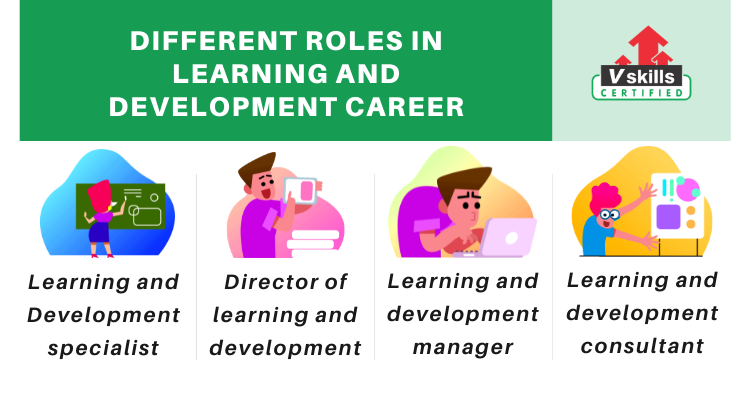Learning and Development (L&D) is an area of work that focuses on delivering and organising job-related training to help workers and individuals gain knowledge and skills. Many who want to make a name for themselves in this area are normally in charge of honing the workforce’s talents and practical skills.
Let us dive deeper into Career in Learning and Development!
What is Career in Learning and Development?
Employee and individual learning and development (L&D) is an area of work that focuses on delivering and managing job-related training. Many employed in this area are typically in charge of improving a workforce’s strengths and practical skills, with responsibilities ranging from studying programme design and management to training delivery.
Learning and development Professionals responsibilities
- Training initiatives that are consistent with the organization’s goals are created by the L&D manager.
- They collaborate closely with different leaders around the company, ensuring that they have a thorough understanding of their units’ training needs.
- They use a variety of training methods, such as e-learning, tutorial sessions, and coaching. By being mindful of the available budget and being able to come up with creative ideas in order to carry out the necessary preparation.
- The professionals in this field establish partnerships with third-party training suppliers and oversee the training development of the HR team.
Qualifications
Employers value advanced credentials and experience more than a degree when it comes to starting a career in learning and development. However, according to a new study, many practitioners have degrees in human resource management, law, social science, education, and psychology. Since technology plays such an important role in learning and growth, candidates with a background in computer science or information technology are often considered for positions in this field by various industries.
Many courses are especially useful because they are globally recognised and enable you to demonstrate your professional reputation by learning core values, skills, and collaborative techniques.
Career Path
Two general career paths exist in Training and Development:
- Individual contributor route is for people who have a lot of knowledge in a specific field but don’t want to be in management role.
- This management path is designed for people who want to work in management roles and areas.
Different Roles
Different roles you can expect after gaining sufficient knowledge about the field are –
L&D specialist
Learning and development specialists, also known as training and development specialists, also have organisational responsibilities. They develop, deliver, and coordinate training programmes to boost employee productivity and boost organisational productivity.
The role’s exact form can vary, but the focus is generally on the design and execution of training programmes, as well as their delivery and facilitation. Creating material for different forms of training is normally part of the job of a learning and development professional. Consider participant content, recordings, hands-on activities, and immersive eLearning.
Director of learning and development
The learning and development director serves a strategic role, evaluating organisational development needs, aligning L&D activities with organisational strategy, drafting the L&D strategy, and ensuring budget to carry out the strategy. The director of learning and growth, first and foremost, serves as the department’s head.
As such, they are in charge of overseeing the department’s operations and identifying the organization’s developmental needs.
Learning and development manager
The learning and development manager is an important part of an organization’s day-to-day learning and development activities. They collaborate with business managers, other members of the L&D department, and HR to organise all L&D activities.
L&D administrators are responsible for keeping track of budgets and negotiating arrangements with third-party training providers, among other items. They report to the director of learning and development – or the head of HR – and serve as the organization’s go-to person for those with concerns about the company’s learning and development programmes.
Learning and development consultant
In a consultancy role, the L&D consultant does all of the above. These tasks may be operational or strategic, depending on the consultant’s position and seniority. A learning and development consultant, for example, may help an organisation with its learning and development plans as well as the execution of its learning initiatives.
They will, however, play an important role in determining a company’s training needs and developing an L&D strategy.
Market Demand and Salary
This is a specialised field with a high demand but a limited supply of talent with the requisite skills. In the near future, it is expected that 89 percent of Indian companies will increase their effort and spend on workforce development. Most commonly, Learning and Development professionals work at:
- Commercial firms
- Educational institutions
- Health service
- Law and financial firms
- Retail companies
- Central and local government
- Training consultancies
- Manufacturing organisations
- Technology training providers
As Indian companies grow their businesses internationally, it is essential to increase investment in learning and development (L&D) to raise employee ability levels to global standards, even though India’s investment in L&D is lower than that of developed countries. TCS, Cognizant, Infosys Limited, Maruti Suzuki India Limited, Hindustan Aeronautics Limited, and others are among the companies involved. They also have an atmosphere where workers can learn new things on a regular basis. A Learning and Development professional’s average salary in India was Rs. 9,14,951.
Resources
Some of the resources which can help you learning about Learning and Development on your own are –
You must first establish a stable foundation before you can become an expert in those fields. And you’ll need to have the right applied skills before you can move on to the practical teaching. You may use the following tools to get a complete understanding of the domain:
- Firstly, Online Tutorials for Learning and Development
- Also, Certification Courses from verified sources such as Vskills, Coursera, Udemy and so on.
- In addition, Online communities
- Moreover, Blogs and study material from experts in this field and many more.
Here are some examples of how you can improve your abilities:
- Freelancing
- Internships
- Apprenticeship programs
The above steps will help you to get this domain started. It’s a long way to go, however. You can take an advanced course to reach a new level of skills.
Conclusion
To make the training programme enjoyable and meaningful, the teacher must have strong interpersonal skills. It is recommended that you have strong listening skills in order to understand the needs of your audience. If the teacher needs to develop their social perception skills, they will be able to empathise with others’ responses and change their messages and approaches accordingly. Rather than acting as a consultant in their organisation, L&D practitioners must build a constructive working partnership with others.
In recent years, the demand for learning and development staff has grown in order to expand employees’ knowledge levels across a variety of sectors, and it has quickly proven to be a lucrative career opportunity.
Discover the career opportunities and other prospects of career in Learning and Development. Hurry up and start preparing now with Vskills.in!



